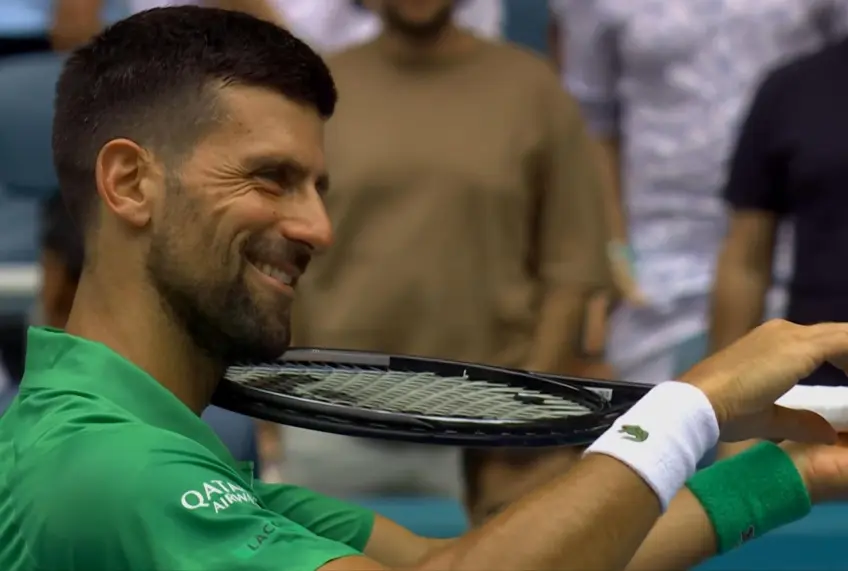
In the sun-drenched hills of Monte Carlo, where the clay courts hum with anticipation, Novak Djokovic recently peeled back the curtain on his Miami Open final loss from earlier this year. The 37-year-old Serbian maestro, a titan with 24 Grand Slam titles to his name, sat down ahead of the Monte Carlo Masters on April 7, 2025, to reflect on a defeat that stung but didn’t dim his fire. Facing off against the teenage sensation Jakub Mensik in late March, Djokovic fell short in a gripping showdown that ended 7-6 (4), 7-6 (4)—a match defined by razor-thin margins and two tie-breaks that slipped through his fingers. Yet, beneath the bitterness of that loss lies a tale of resilience, high-level tennis, and a champion’s unyielding spirit.
The Miami final was a clash of eras, pitting Djokovic’s seasoned brilliance against the raw, fearless energy of 19-year-old Mensik, a Czech prodigy who grew up idolizing him. For Djokovic, it was a golden chance to notch his 100th career title, a milestone that would place him alongside legends like Jimmy Connors and Roger Federer in the Open Era’s century club. He’d cruised through the tournament without dropping a set until that fateful Sunday, his serve a weapon of precision and his movement a masterclass in endurance. But Mensik, ranked 54th in the world, brought an arsenal of his own—14 aces and a nerve of steel—turning the Hard Rock Stadium into a battleground where youth dared to topple experience.
Djokovic’s voice carried a mix of frustration and grace as he revisited the match. “We spoke about Miami,” he said, his words measured but tinged with the sting of what might have been. “I had a bit of a bitter feeling at the end of losing the final, but it was high quality for me. Served great and played well. I was just a bit unlucky in the final—two tie-breaks—but he was better. That is all.” It’s a candid admission from a man who rarely tastes defeat, let alone in a final. The match, delayed nearly six hours by rain, tested both players under humid, slippery conditions. Djokovic slipped twice, battled a nagging issue under his right eye, and even sprinkled sawdust on his grip to combat the dampness. Yet, he refused to lean on excuses, focusing instead on the tennis itself—a duel he deemed exceptional, even in defeat.
Mensik, meanwhile, seized his moment. The teenager, who nearly withdrew from the tournament due to knee inflammation, turned the tables on his childhood hero. “I started playing tennis because of you,” he told Djokovic during the trophy ceremony, his voice trembling with emotion. “There is no harder task for a tennis player than to beat you in the final of a tournament.” For Djokovic, those words carried weight. He’d mentored Mensik years ago, inviting the then-16-year-old to train with him after spotting his potential. Now, that pupil had become a conqueror, delivering clutch serves and a leaping backhand smash that sealed the first set—a shot that echoed Pete Sampras in its audacity.
Despite the loss, Djokovic found silver linings in Miami. “Overall obviously now bitter taste because of the loss,” he admitted, “but Miami really brought me a lot of joy and really good sensations on and off the court.” The fans, all 14,000 of them, roared for him, their support a lifeline as he fought to rally. It was his first Miami appearance since 2019, and the love from the crowd—coupled with a pre-final chat with Lionel Messi and his family—reignited his passion. “I’ve been struggling to find the level of tennis and enjoyment,” he confessed, “but here, without a doubt, I enjoyed the most that I have enjoyed in the last couple of years in any tournament.”
As he gears up for Monte Carlo, Djokovic’s focus sharpens. The clay season offers a fresh canvas, a chance to shake off that Miami bitterness and chase that elusive 100th title. At 37, he’s the oldest Masters 1000 finalist ever, a record he set in Miami, and his hunger remains insatiable. Mensik may have won the day, but Djokovic’s parting words—“It hurts me to admit it, but you were better”—signal not a surrender, but a spark. In a sport where every loss fuels the next victory, this chapter only deepens the saga of a champion who thrives on the edge of triumph and tribulation.
Leave a Reply